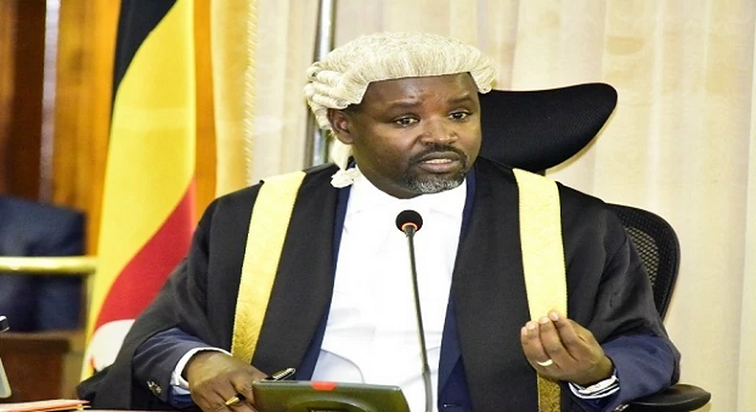L-R: Moses Nteega, Everlyn Chemutai (Bukwo DWR), Brenda Nabukenya (DWR Luwero) and Hope Grania Nakazibwe(DWR Mubende)while addressing journalists at Parliament.
Lawmakers through the Uganda Women Parliamentary Association (UWOPA) have urged Government to increase funding to the innovation and technology sector so as to empower and attract more women into the Science, Technology, Economics and Mathematics (STEM) sector that have for long attracted few numbers of females.
The lawmakers made the call while addressing journalists at Parliament ahead of the international women’s day that is slated to be held in Kiruhura district under the global theme; Digital: Innovation for a gender equal future, while Uganda will hold its celebrations under the theme; ‘Equal opportunities in education, science and technology for innovation and gender equal future.’
“As UWOPA, we continue to emphasize the importance of protecting rights of women and girls in digital spaces, addressing online and OICT-facilitated gender based violence and also spotlight the importance of bringing women and other marginalized groups into technology which results into more creative solutions that enhance greater potential for innovations that meet women’s needs and promote gender equality,” said Grania Nakazibwe (DWR Mubende).
Nakazibwe cited the high rates of teenage pregnancies as one of the avenues that have hampered women from pursuing studies in technology, sciences and innovation.
She explained, “There are a number of girls who usually intend to pursue sciences but if they get pregnant, before the time they aimed at, just know they will not complete education. Uganda is one of the leading nations with many teenage mothers and we need to intensify on the campaign to reduce the numbers of teenage pregnancies among children.”
“We have also witnessed that the high mortality rates in Uganda are amongst teenage mothers who get pregnant before their bodies are ready. Behind every pregnant teenage mother there is a man behind her but most times, the man isn’t fronted. We should desist from marrying off our children early so as to enable them contribute in society,” added Nakazibwe.
Her remarks comes at the time the 2022 Annual Crime Report by Uganda Police recorded increased cases of Defilement to a tune of 12,580 cases of Defilement were reported to Police in 2022, compared to 14,436 cases reported in 2021, giving a decrease by 12.8% in Defilement cases registered countrywide.
Of the cases Defilement reported in 2022, 8,960 cases were Defilement while 3,620 cases were Aggravated Defilement. Out of the Defilement cases reported in 2022, 4,725 cases were taken to Court, 817 cases were not proceeded with while 7,041 cases are still under inquiry. Out of the cases taken to Court, 205 cases secured convictions, 01 case was acquitted, 03 cases were dismissed and 4,515 cases are still pending in Court.
At the height of the lockdown imposed to contain the spread of COVID-19, Uganda witnessed increased cases of teenage pregnancies with a March 2020 study conducted by United Nations Population Fund highlighting that a total of 354,736 teenage pregnancies were registered in 2020, while 295,219 teenage pregnancies were registered between January to September 2021. This implies that on average, over 32,000 teenage pregnancies are recorded per month.
Among the districts with highest cases of teenage pregnancies included; Kamuli 6,535 Mayuge 6,205, Mukono 5,535 Wakiso 10,439 Rakai 2,711 Luwero 4,545 Kampala 8,460, Oyam 6,449 Lira 4,697, Arua 4,705 Yumbe 3,973 Kasese 7,319 Kyenjojo 4,341, Rakai 2711, Luwero 4545 and Kampala 8460.
Brenda Nabukenya (DWR Luwero) who also doubles as Vice Chairperson UWOPA said that although Uganda has registered strides in gender equality, there is need to reflect on the unfinished strategies to achieve this especially when dealing with the issue of cost of internet that has hampered women to access internet based platforms.
Everlyn Chemutai (Bukwo DWR) called for the end to the barbaric practice of Female Genital Mutilation (FGM) remarking, “When we talk about rural women, we still have the challenge of FGM practice in the kalengin family and part of the Sabiny who still do it stealthily and it affects the girl child.”
The executive director of Joy for Children, Moses Nteega says that there is need to look at the gaps in the education system which are stopping young girls from taking up science and ICT subjects.





